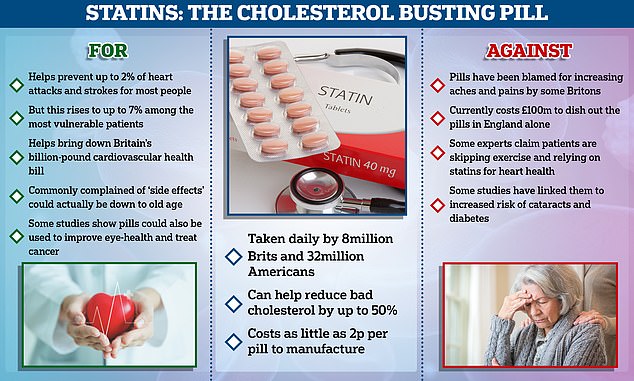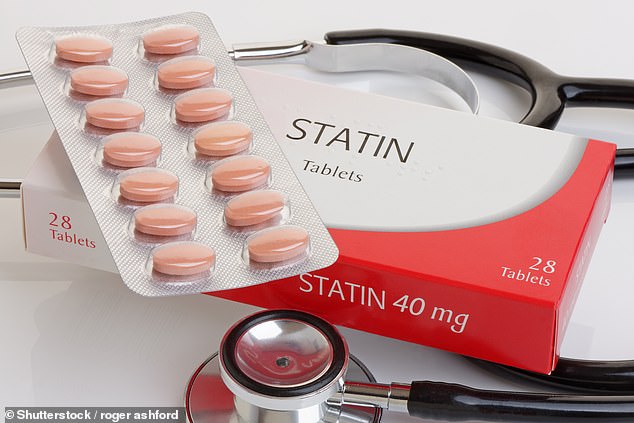The TRUTH on statins: Are the cholesterol-busting pills safe?
>
It’s a landmark decision that could see millions more Britons prescribed statins.
But at the same time, the move has reignited a decades-long row over whether the cholesterol-busting pills are safe.
Numerous, influential studies have proven that statins, which cost as little as 2p a tab, are life-savers, drastically cutting the odds of a heart attack or stroke.
Yet a small but vocal community, frequently dubbed ‘statin deniers’, have never been truly convinced of their benefits.

A change in official guidance could open the door to millions more Britons being prescribed statins
They claim pills condemn people to live with miserable side effects like muscle pains, headaches, and stomach issues, all for very little individual benefit.
Yet health chiefs are so confident in the drugs, already taken by millions across the world, that they’re planning to allow any adult to simply request them from their GP.
Previously doctors were told to only offer the drugs to patients with a 10 per cent or higher risk of suffering a heart attack or stroke within a decade.
The change in guidance, revealed by the National Institute for Health and Care Excellence (Nice) yesterday, could open the floodgates to millions more people taking the pills.
Statin skeptics have condemned the decision, saying it will not only increase demand on GPs but cause thousands more people to suffer from the drug’s painful side effects.
Some have argued that as the drugs are estimated to prevent one in 50 heart and attacks and strokes, an individual taking them is statistically unlikely to see a direct benefit.
And others claim statins are another system of the ‘over-medicalisation’ of society.
However, health charities and leading experts have insisted the move is the right step, given the pills undisputable ability to prevent cardiovascular disease, one of the world’s top killers.
Additionally, recent research has suggested the aches and pains attributed to statin side effects are actually caused by old age, and the drugs have been wrongly blamed.
Here, MailOnline answers everything you need to know.
They’ve been around for decades and millions take them every day, but what exactly are statins?
Statins are a family of drugs designed to reduce the level of low-density lipoprotein (LDL), also known as bad-cholesterol, in the blood.
The pills are absorbed by the body’s digestive system, where they then reduce the production of LDL in the liver.
After years of being developed in labs and going through rigorous trials trials, they eventually burst onto the wider medical scene in the 80s when they were originally approved.
What are the most common types of statins, and what are they made of?
Atorvastatin, fluvastatin, pravastatin, rosuvastatin and simvastatin are the only five types of statin currently prescribed in the UK.
Some statins are derived from compounds naturally found in fungi, while others are synthetically created in laboratories.
Doctors recommend different statins, which cost mere pennies to make, depending on the individual patient’s cholesterol level, with some of the drugs being stronger than the others.
Other factors, like medical or family history of heart disease, and if the patient is taking any other medications, can lead a GP or cardiologist to prescribe one type of statin over the other.


Millions more people will be able to get statins on the NHS under radical new guidelines aimed at preventing thousands of heart attacks and strokes
So, how many people take them and how often?
People on statins take them daily, usually for the rest of their lives.
About 8million people in the UK, and 32million Americans, already take the pills, making them one of the most commonly taken medications worldwide.
Why are so many people on them? What do they do and how do they work?
Statins are a form of preventative medicine, i.e. a drug designed to reduce the risk of a medical problem before it occurs.
In their case, this is to reduce the risk of heart attacks and strokes through slashing levels of bad cholesterol.
Cholesterol is a fatty material made by the liver from digested food that then travels through the body via the bloodstream.
The substance plays an important role in bodily function, helping cells work and being a building block for vitamin D as well as hormones which help keep the human body healthy.
But too much of it can lead to fatty material building up in the arteries, tubes that transport blood around the body, which can then cause problems like heart disease.
High cholesterol is estimated to cause a third of all ischaemic heart disease, and is also a contributor in many other cases.
In England alone, high cholesterol is estimated to contribute to over 7 per cent of all deaths, as well as causing just under 4 per cent of years of life lost to disability.
This is where statins come in. The pills can reduce bad cholesterol levels by around 30 per cent and even up to half with higher doses.
Sir Chris Whitty, the UK’s chief medical officer, recently warned that thousands of middle-aged people are dying of heart conditions because they did not get statins or blood pressure medicines during the pandemic.


While millions of people are able to live normal lives thanks to the cholesterol-busting effects of statins the drugs have been linked to numerous side-effects that put some off the medication. However, many of these supposed symptoms — including memory loss, diabetes and headaches — may actually be a result of other lifestyle factors
How effective are they?
Nice has estimated that statins can prevent one heart attack or stroke for every 50 people with a 5 per cent risk cardiovascular disease, who take the pills over 10 years.
But the benefits increase further for patients at higher risk, with statins helping prevent one heart attack and stroke for every 14 people with a 20 per cent risk of cardiovascular disease, who take the pills over a decade.
Paul Chrisp, director of the Centre for Guidelines at Nice, said: ‘What we’re saying is that, for people with a less than 10 per cent risk over ten years of a first heart attack or stroke, the decision to take a statin should be left to individual patients after an informed discussion of benefits and risks.
‘The evidence is clear, in our view, that for people with a risk of 10 per cent or less over 10 years, statins are an appropriate choice to reduce that risk.’
He added that Nice is not saying statins should be used alone and that it will be the responsibility of GPs to explain how people can reduce their risk of cardiovascular disease and the benefits and risks of taking the daily pills.
So if they’re so good, why the controversy?
Statins, like all medications, carry a number of potential, nasty side effects.
Though, not all patients will experience all of them, and many will have none at all.
Muscle aches and pains are one of the most common side effects, according to the NHS.
Other common side effects include headaches, dizziness, nausea, fatigue, digestive problems, and insomnia, and more rarely, memory loss.
Some patients suffering these side effects argue that these symptoms greatly reduced their quality of life.
It has been estimated that between a third and half of users stop taking the pills entirely or don’t take them as often as they should because of these side effects.
Some other studies have also linked the pills to an increased risk of cataracts and diabetes though this disputed for the former and considered a very minor risk for the latter.
Another controversial aspect of statins is their use as a widespread preventative medication.
Some critics claims this contributes to an over-medicalisation of society and that the negative side effects not worth the protective benefits.
And some experts claim patients on statins are less likely to make lifestyle changes to combat cholesterol, such as increasing the amount of exercise they do, and instead rely on the pills to protect their heart health.
Surely the benefits outweigh the risks?
Heart health charities and medical groups insist the benefits of statins vastly outweigh the overall risks for most patients.
Sir Nilesh Samani, medical director at British Heart Foundation, described the new Nice guidance as ‘good news’ that it will help to reduce the number of heart attacks and strokes.
‘Heart attacks and strokes still kill more people prematurely than anything else, with high levels of cholesterol being a major risk factor,’ he said.
‘Research has shown that statins are largely safe.
‘However, the decision to start this medication, which needs to be taken on a on a long-term basis, is very much a personal choice.
‘The decision should be based on a conversation with your GP, and should be combined with other measures such as eating a healthy diet and exercising regularly to get the most benefit.’
Professor Kamila Hawthorne, Chair of the Royal College of GPs, has also said: ‘There is a good research base that shows statins are safe and effective at reducing the risk of cardiovascular conditions, such as stroke and heart attacks, when prescribed appropriately.
‘GPs are highly trained to prescribe statins within clinical guidelines and in conversation with patients – long term statin therapy, however, won’t be suitable or desirable for everyone, and a decision to prescribe them will never be taken lightly.
So with thousands of patients swearing off statins due to the side effects, what’s the truth behind the scare stories?
A major ‘gold standard’ study last year found that most of the muscular aches and pains commonly attributed to statins are actually just the result of old age.
Statins are usually prescribed as people get older, and their risk of cardiovascular disease rises.
Conveniently, this is also the age when people start experiencing some of other health consequences of reaching their later years, such as increased aches and pains.
The onset of these symptoms and starting to take the pills can become linked in the patient’s mind, despite almost always being a coincidence.
In the major study, that warranted a change in stance from Nice, experts from Oxford University found the pills were only responsible for about 10 per cent of cases of aches and pains among the patients prescribed them, with the rest usually caused by natural ageing.
The study, published in The Lancet last year, examined 155,000 patients who took statins or placebos in 23 randomised trials.
They found that in total 27.1 per cent of patients on the drugs reported muscle pain or weakness, compared to 26.6 per cent of those who were given the placebo.
The near-identical risk effectively cleared statins as being the main culprit behind the aches and pains.
However, the researchers did find the risk increased slightly with the strength of the statin prescribed, though the vast majority of cases were mild.
How much does prescribing statins cost the nation versus the benefits?
Statins are incredibly cheap to produce, costing about 2p per pill, but the volume in which they are dished out quickly adds up.
The NHS currently spends about £100million prescribing statins in England alone, though this figure could go up if more people start taking the pills.
But, this cost is dwarfed by the estimated £7.4billion per year total healthcare bill of treating cardiovascular disease in England.
Reducing emergency incidents of cardiovascular disease like heart failure, heart attacks and strokes, also has other benefits.
It frees up both ambulances and hospital resources like beds which can then be used for other patients, or elective procedures.
Are statins the only way drug to that can reduce high cholesterol? What about healthy diet and exercise?
While the vast majority of evidence points to statins being an effective treatment for high cholesterol and well-tolerated by most patients, they are not the only medication or method for treating the problem.
Other drugs like the tablet ezetimibe are available and are often prescribed alongside statins to help lower cholesterol further.
Another option are PCSK9 inhibitors, drugs which also lower cholesterol but are injected into the body every two to four weeks, rather than swallowed as a pill.
They are normally only prescribed if patients cannot tolerate other forms of cholesterol medication, and are much more expensive than statins.
Another method for reducing cholesterol is eating more healthily, getting regular exercise, and cutting back on drinking and smoking.
This takes time to work so shouldn’t be seen as a substitute for taking medication if advised to do so by a health professional.
However, people on statins, and the population in general, are advised to make these lifestyle changes to boost their cardiovascular health anyway.
People with a serious heart condition should talk to their doctor before starting a new exercise regime.
Do statins have any other purpose?
As statins are taken by such a large number of people experts have been exploring if they help treat, or reduce the risk of, other health problems.
In contrast to some studies suggesting statins could increase the risk of cataracts, one study found patients on the cholesterol-busting pills are 15 per cent less likely to get age-related macular degeneration.
Age-related macular degeneration is one of leading causes of severe visual impairment among older people.
The analysis, by University Hospital Bonn in Germany and published in November, examined studies involving almost 40,000 across Europe.
Researchers found that people taking drugs to lower cholesterol had a 15 per cent reduced risk of developing age-related macular degeneration compared to those who were not taking the pills.
Another study published last year in the journal BJU International found 11 out of 12 prostate cancer patients saw their tumour growth slow after taking statins.
Charities called the findings ‘encouraging’, given the drugs are cheap and proven to be safe but added further research needed to be done before the pills could be rolled out to cancer patients.


While Brits are normally encouraged to include fresh fruit in their diet, people on statins should be cautious about grapefruit which can counteract the medication
Are there any food or drinks to avoid when taking statins? Is the grapefruit rumour true?
Many statin users are warned not to eat grapefruit because the fruit disrupts how the body processes the drug.
Grapefruit contains furanocoumarins, which blocks an enzyme in the intestine that normally breaks down statins and some other drugs.
This means the statins build up in the bloodstream rather than being processed properly, which can increase the risk of other side effects.
But grapefruit only appears to have a large effect on certain statin medications, with others seeing little to no problems.
The information leaflet that comes with statins should tell a patient if their drug is one of those affected by grapefruit and what amount is safe to consume.
In other news…
Is YOUR area a scarlet fever hotspot? Cases of illness caused by Strep A bug soared to highest level since the 1950s last year, data shows – as map reveals worst-hit regions
Are striking NHS staff on brink of new £3bn pay deal? Steve Barclay ‘admits 1million medics deserve one-off cash boost… but Treasury says he’ll have to raid his OWN budget’
How rife is Covid in YOUR area? Interactive map reveals up to one in 14 people were infected in UK’s worst-hit boroughs last week – but cases are tumbling despite warnings of ‘Kraken’ surge
